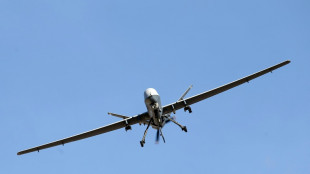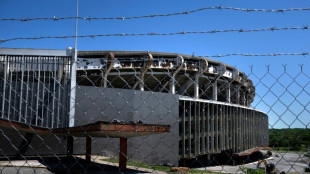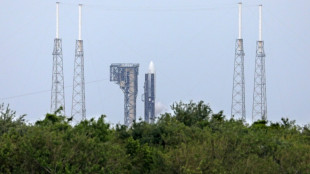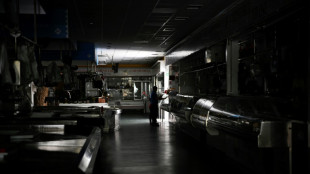
-
 US lost seven multi-million-dollar drones in Yemen area since March
US lost seven multi-million-dollar drones in Yemen area since March
-
Bucks blow as Lillard suffers torn Achilles: team

-
 Putin orders three-day truce amid new US warnings
Putin orders three-day truce amid new US warnings
-
Real Madrid's Ancelotti agrees Brazil deal - reports

-
 ChatGPT adds shopping help, intensifying Google rivalry
ChatGPT adds shopping help, intensifying Google rivalry
-
Global stocks mixed amid trade hopes as markets await tech earnings

-
 Commanders heading back to D.C. after inking $3.7 bln stadium deal
Commanders heading back to D.C. after inking $3.7 bln stadium deal
-
US warplane falls off aircraft carrier into Red Sea

-
 Feisty Arteta urges Arsenal fans to 'bring boots' to PSG Champions League clash
Feisty Arteta urges Arsenal fans to 'bring boots' to PSG Champions League clash
-
Bucks blow as Lillard suffers ruptured Achilles: reports

-
 No power, no phone, no transport -- Spain in a panic
No power, no phone, no transport -- Spain in a panic
-
US warplane went overboard into Red Sea: Navy

-
 'Like a dream' as IPL's 14-year-old Suryavanshi becomes youngest to hit T20 ton
'Like a dream' as IPL's 14-year-old Suryavanshi becomes youngest to hit T20 ton
-
Luis Enrique says PSG have improved since October Arsenal loss

-
 UN food, refugee agencies warn of huge cuts after funding losses
UN food, refugee agencies warn of huge cuts after funding losses
-
Trump trade war dominates BRICS meeting in Brazil

-
 Rashford expected to miss rest of Aston Villa season
Rashford expected to miss rest of Aston Villa season
-
IPL's 14-year-old Suryavanshi youngest to hit T20 ton as Rajasthan rule

-
 Halle Berry, Jeremy Strong to join Cannes film festival jury: organisers
Halle Berry, Jeremy Strong to join Cannes film festival jury: organisers
-
Klopp congratulates Liverpool on Premier League triumph

-
 Violence-weary Trinidadians vote in general election
Violence-weary Trinidadians vote in general election
-
Abuse scandal in focus in search for new pope

-
 Prince William and Kate mark wedding anniversary in Scotland
Prince William and Kate mark wedding anniversary in Scotland
-
Amazon set for launch of Starlink-rival satellites

-
 London mayor Sadiq Khan targets Olympic history for city
London mayor Sadiq Khan targets Olympic history for city
-
Stock markets diverge amid trade hopes, ahead of earnings

-
 Canada votes as Trump renews US takeover push
Canada votes as Trump renews US takeover push
-
Massive blackout hits all of Spain and Portugal

-
 Conclave starts May 7, cardinals say new pope must tackle abuse
Conclave starts May 7, cardinals say new pope must tackle abuse
-
BRICS ministers meet in Brazil over Trump trade policies

-
 Trump escalates immigration crackdown to mark 100 days
Trump escalates immigration crackdown to mark 100 days
-
Outkast, White Stripes, Cyndi Lauper among Rock Hall inductees

-
 Putin orders three-day truce in May but Ukraine asks 'Why wait?'
Putin orders three-day truce in May but Ukraine asks 'Why wait?'
-
Eubank Jr discharged from hospital following boxing grudge match

-
 China deploys army of fake NGOs at UN to intimidate critics: media probe
China deploys army of fake NGOs at UN to intimidate critics: media probe
-
Empty shelves? US Treasury secretary not concerned 'at present'

-
 Slot told Liverpool they could win the league at season start: Konate
Slot told Liverpool they could win the league at season start: Konate
-
Spain brought to a halt by huge blackout

-
 Stock markets mostly higher amid trade talk hopes
Stock markets mostly higher amid trade talk hopes
-
Conclave starts May 7, with cardinals saying new pope must tackle abuse

-
 Massive blackout hits Spain and Portugal
Massive blackout hits Spain and Portugal
-
Ruediger 'must show respect to others' says Germany boss Voeller

-
 As Canada votes, Trump pushes US takeover plan
As Canada votes, Trump pushes US takeover plan
-
Ten on trial in Paris over 2016 gunpoint robbery of Kim Kardashian

-
 African players in Europe: Salah scores, takes selfies as Reds seal title
African players in Europe: Salah scores, takes selfies as Reds seal title
-
Bangladesh spinner Taijul's 5 wickets trigger Zimbabwe collapse in 2nd Test

-
 French mosque murder suspect, 21, surrenders in Italy
French mosque murder suspect, 21, surrenders in Italy
-
Mayor Khan keen for London to make Olympics history

-
 Iranian president visits Azerbaijan as ties warm
Iranian president visits Azerbaijan as ties warm
-
What we know ahead of the conclave


Apollo to Artemis: Why America is betting big on private space
A private Houston-based company is set this week to lead a mission to the Moon which, if successful, will mark America's first lunar landing since the end of the Apollo era five decades ago.
Reputation will be on the line when Intuitive Machines' Nova-C spaceship will launch atop a SpaceX rocket on Wednesday, following recent completed touchdowns by China, India and Japan.
So why entrust such tasks to the commercial sector, especially after an attempt by another company with similar goals, Astrobotic, failed just last month?
The answer lies in the way NASA has fundamentally reorganized itself for Artemis, the agency's flagship Moon-to-Mars program.
During the Cold War, the space agency was handed blank checks and managed industrial contracts down to the last bolt -- but the new paradigm bets on America's mighty market economy to deliver breakthroughs at a fraction of historic costs.
While the current approach has borne some fruit, it also carries the risk of the United States falling behind its principal space rival, China, in achieving major milestones -- namely the next crewed mission to the Moon, and getting the first rocks back from Mars.
- SpaceX success -
The focus on fledgling companies under NASA's Commercial Lunar Payload Services (CLPS) initiative builds on the example set by the meteoric rise of SpaceX, which was derided in its startup phase as reckless, but is now arguably the agency's favorite contractor.
Scott Pace, a former member of the National Space Council, told AFP that NASA had intentionally adopted a policy that prioritized "more shots on goal" at lower costs.
"The reliability that SpaceX has now is as a result of painfully blowing up multiple rockets along the way," he said.
SpaceX launches are currently the only way astronauts launch from US soil, following the end of the NASA-led space shuttle program in 2011 that left NASA reliant on Russia's Soyuz rockets.
Elon Musk's company beat heavily-favored aerospace giant Boeing in certifying its system first, proving for experts the value of competition between companies providing different options.
Each space shuttle launch cost over $2 billion, adjusted for inflation, according to a study in the journal Nature, while the estimated average cost for NASA to buy a seat on a SpaceX flight is around $55 million, according to a government audit.
- On to Artemis -
During the Apollo era, NASA was given more than $300 billion, according to an analysis by Casey Dreier of the nonprofit Planetary Society -- far more than the $93 billion to be spent by 2025 on Artemis.
Rather than telling private industry exactly what to build, the agency now purchases services from companies -- though this at-times piecemeal approach carries certain drawbacks.
While NASA owns the giant Space Launch System (SLS) rocket and the Orion crew capsule, it has contracted with SpaceX an unconventional and as yet unproven landing system based on the company's next-generation Starship rocket, to provide the first crewed lunar touchdown.
Starship has yet to complete a flight test without blowing up -- and it requires ultra-cold refueling multiple times while in orbit before it travels to the Moon, independently of SLS, to dock with Orion and pick up the astronauts.
Futuristic space fuel depots could be a great way to facilitate long-range missions to Mars -- the founding ideal of SpaceX, which Musk pursues with messianic fervor -- but getting it right could well delay the return of American boots to the Moon.
NASA has said this could take place by 2026 at the earliest, though that timeline threatens to drag. China, meanwhile, has set a deadline of 2030 for its own crewed landing -- and has lately stuck to its promises.
The Chinese "don't go through all of the shenanigans the US has, which is extreme polarization followed by government shutdown threats, followed by continuing resolutions," G. Scott Hubbard, a former top NASA official, told AFP.
For better or worse, America is locked into its new public-private paradigm.
Artemis was intentionally designed with an array of international partnerships -- Europe, Canada, Japan, the United Arab Emirates and more -- in order to prevent it from being scrapped, said Dreier.
Moreover, a previous Moon-to-Mars program called Constellation that was conceived in the 2000s and managed more like Apollo was canceled, largely due to budget constraints, so there is little realistic alternative.
Th.Berger--AMWN


